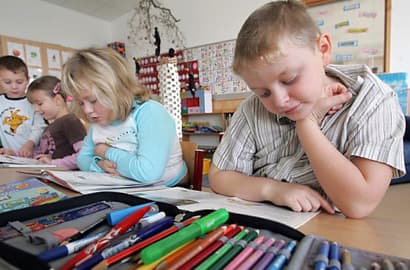More non-native speakers in schools

The number of school pupils who are not native-German speakers has risen in Austria, despite falling student numbers.
Around 21 percent (or 234,000) students speak a language other than German, according to figures for 2013/14 from Statistics Austria.
This is an increase of 7,700 on the previous year, or one percent of the total number of students. The majority of students who speak another language are in Vienna (46 percent), followed by Vorarlberg (22 percent) and Salzburg (18 percent), with the fewest in Carinthia (11 percent).
The highest percentages of students with a non-German mother tongue are in the so-called special schools, for children with special educational needs (31 percent), followed by New Middle Schools (NMS) and pre-vocational schools (PTS) each with 28 percent, and primary schools (27 percent).
In Vienna two thirds of secondary school students speak a language other than German. The proportion of pupils with a non-German native language in public schools (21.5 percent) is only slightly higher than in private schools (17 percent).
The most commonly spoken languages after German (876,000) are variants of Bosnian, Serbian and Croatian (a total of 67,000 students), followed by Turkish (59,000) and Albanian (16,000).
Eleven percent of students were registered as foreigners in 2013/14. Most non-Austrian nationals came from Turkey (16,100), followed by Serbia and Montenegro (14,100), Germany (13,600), Bosnia and Herzegovina (11,400) and Croatia (8,700 ).
Figures from Statistics Austria show that the number of German nationals has increased steadily in recent years, whilst the number of Turks, Serbs, Bosnians and Croats has declined.
Comments
See Also
Around 21 percent (or 234,000) students speak a language other than German, according to figures for 2013/14 from Statistics Austria.
This is an increase of 7,700 on the previous year, or one percent of the total number of students. The majority of students who speak another language are in Vienna (46 percent), followed by Vorarlberg (22 percent) and Salzburg (18 percent), with the fewest in Carinthia (11 percent).
The highest percentages of students with a non-German mother tongue are in the so-called special schools, for children with special educational needs (31 percent), followed by New Middle Schools (NMS) and pre-vocational schools (PTS) each with 28 percent, and primary schools (27 percent).
In Vienna two thirds of secondary school students speak a language other than German. The proportion of pupils with a non-German native language in public schools (21.5 percent) is only slightly higher than in private schools (17 percent).
The most commonly spoken languages after German (876,000) are variants of Bosnian, Serbian and Croatian (a total of 67,000 students), followed by Turkish (59,000) and Albanian (16,000).
Eleven percent of students were registered as foreigners in 2013/14. Most non-Austrian nationals came from Turkey (16,100), followed by Serbia and Montenegro (14,100), Germany (13,600), Bosnia and Herzegovina (11,400) and Croatia (8,700 ).
Figures from Statistics Austria show that the number of German nationals has increased steadily in recent years, whilst the number of Turks, Serbs, Bosnians and Croats has declined.
Join the conversation in our comments section below. Share your own views and experience and if you have a question or suggestion for our journalists then email us at [email protected].
Please keep comments civil, constructive and on topic – and make sure to read our terms of use before getting involved.
Please log in here to leave a comment.